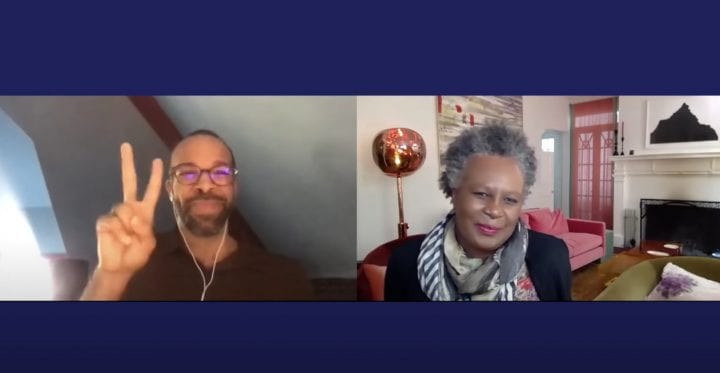
To Be in the Truth of Us: Dujie Tahat on Claudia Rankine’s “Just Us”
October 20, 2020
This essay is part of a series in which Poetry Northwest partners with Seattle Arts & Lectures to present reflections on visiting writers from the SAL Poetry Series. On Friday, September 25, Claudia Rankine read and discussed her work in conversation with Douglas Kearney. Listen to a recording of it on KUOW’s Speakers Forum.
Tickets and subscriptions to more poets at SAL—including Maggie Smith, Ocean Vuong, Toi Derricotte, Natalie Diaz, Douglas Kearney, and Alberto Ríos—can be purchased at lectures.org.
By Dujie Tahat
Claudia Rankine’s Just Us shines a light on that invisible force that orders so much of American civil society: whiteness. Though subtitled An American Conversation, the book betrays a messy and still-processing interiority. Through a compendium of essays, charts and graphs, a few poems, quotes, images, screenshots of tweets and Facebook posts, Rankine charts a different kind of lyric. She is not shy about claiming the speaker as herself. In her discussion with Douglas Kearney as part of the Seattle Arts & Lectures Women You Need to Know Series, Rankine pointed to the importance of filtering the questions of whiteness through herself and her experience.So the book is very much in the midst of reckoning with what relationship Rankine—as well as the white people she’s married to or friends with—has to whiteness, how it’s exercised, and Americans’ historic refusal to exorcise it.
Just Us is a capacious book. Billed as the culmination of a trilogy on race in America, the book is a hefty 342 pages, hard-cover bound, printed on glossy, heavy-weighted paper. As with its antecedents, Citizen and Don’t Let Me Be Lonely, sometimes the light hits the page in such a way the text itself becomes illegible. The whiteness is blinding. The primary text of Just Us appears on the right side of the spine; the left reserved for a variation of images, annotations that include fact-checks, old news clippings, video stills, and sometimes blankness. Each essay has a title page. There are two-page spreads of images that bleed to the edge. It’s a book that gives readers space. It enacts the starts, stops, and interruptions of conversations—even the ones we carry with ourselves. It is ultimately a generous act to invite the reader to reflect on themselves, offering a wide array of entry points to catch a glimpse of that slippery idea of whiteness.
Rankine approaches whiteness, primarily, by way of conversation with white people. The book presents more than just that of course: a Baldwin quote lineated so as to appear a poem, a dinner conversation with Black faculty, and Rankine’s own anxieties about marriage, teaching, raising a mixed-race Black daughter in a predominantly white, wealthy world immediately come to mind. However, the bulk of Just Us recounts and renders various conversations with white people—acquaintances and intimates alike—often in temporary, liminal spaces: on plane rides, in couple’s therapy, at a friend’s house, in a hallway. In these thresholds, Rankine not only presents the reader with an excessive mix of visual and linguistic signifiers, but by engaging in the form of conversation, she places herself alongside others and the reader. Temporally, historically, positionally—Rankine is troubling the book’s subject: us.
I wish to stop time and have feelings of intimacy blanket all time, both historical time and the years that took us from our late twenties to our late fifties. But to stop being conscious of my friend’s innate advantages is to stop being present inside our relationship. To remember the truth of us is to be in the truth of us, in all its realities and all its stumbles and slips.
In so many ways, Just Us reflects Rankine’s interest in process. It’s a book that makes room for people’s stumbles and slippages. As Rankine said in her conversation with Kerney, this book resists “prescriptions.” It ostensibly has no interest in polemics or offering solutions. She nor the book suppose a path forward. Instead, its formal messiness and discursive interiority enacts Rankine’s lived experience of open-ended curiosity, oscillating between intimate poetic gestures and distanced academic theory, as well as the ever-frustrating work of drawing whiteness to the foreground.
In this way, it makes sense that the primary audience of Just Us is white people. In that sense, it perhaps makes a better companion to Robin DiAngelo’s White Fragility than Angela Davis’ Are Prisons Obsolete? The book opens by addressing white folks, after all, asking, “What does it mean to want / an age-old call / for change / not to change // and yet, also, / to feel bullied / by the call to change?”, and, by and large, doesn’t let up. We learn in an early essay that Rankine teaches a course on whiteness at Yale—one of the most popular classes on campus. She also offers her white conversation partners plenty of space in the book to respond to her recounting of their interactions—in so doing, contextualizing and, hopefully, deepening their shared understanding and relationships (all reminiscent of an exchange Rankine had a decade ago with Tony Hoagland following the publication of a racist poem). Interestingly enough, this gesture most clarifies the paradoxical experience of the non-white reader: being the subject of Rankine’s direct address, “you,” but witnessing it cast on some white other who is not me.